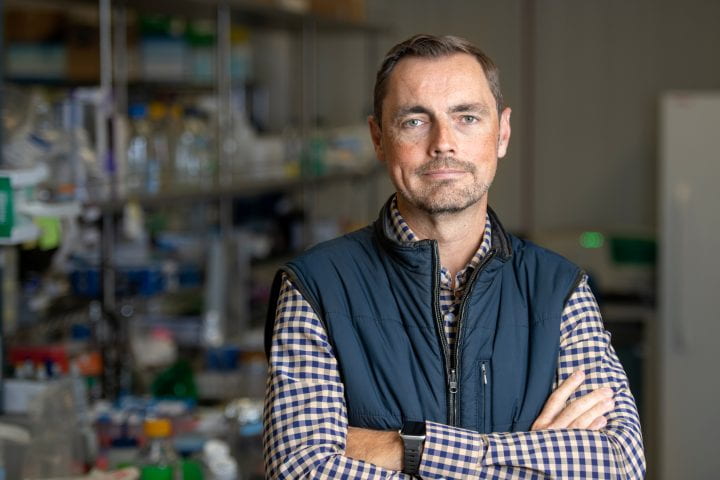UC Irvine-led research team leverages power of ribosomes to develop chemical libraries
Transformative technique replaces manual process, accelerating discovery of new drugs

Irvine, Calif., Aug. 23, 2023 — A research team led by University of California, Irvine scientists has developed an innovative method for quickly and efficiently creating vast collections of chemical compounds used in drug discovery by harnessing the power of ribosomes, the molecules found in all cells that synthesize proteins and peptides.
Findings recently published in ACS Central Science describe this transformative technique, which could replace the current manually intensive process, accelerating the discovery of new drugs that could affect treatment of a wide array of diseases and conditions.
Chemical libraries are collections of molecules that are screened to identify those with promising activity or therapeutic potential. Screening involves asking the same biological question of each chemical in the library in the form of a rapid experiment or assay.
“Library synthesis and screening are the first steps in the discovery of new medicines,” said Brian M. Paegel, UCI professor of pharmaceutical sciences and the study’s co-corresponding author. “This new technology allows us to synthesize libraries of ultra-miniaturized gel beads that each contain hundreds of thousands of copies of a single compound from the library. The arrangement of so many copies of molecules on beads allows scientists to evaluate the biological activity of each library member directly, an invaluable capability in the search for new medicines.”
The team invented a novel approach to generate gel beads that are roughly the size of a human cell, each containing vast quantities of ribosomes, an enzyme called RNA polymerase and a magnetic core adorned with DNA, not unlike a human cell’s nucleus. The DNA cores encode – or provide assembly instructions for – specific peptide molecules. Insulin is an example of a naturally occurring peptide that has become a drug.
By mimicking a cell’s flow of genetic information from DNA to RNA to peptide synthesis, the researchers successfully localized genetically encoded peptide synthesis within each individual gel bead. Importantly, this technique can be executed in parallel on millions of beads, each with a unique DNA tag, forming an expansive library.
“The beads themselves are also an important achievement. Chemical synthesis that currently depends on labor-intensive manual procedures is now facilitated by the ribosome, allowing us to prepare very large libraries using nature as our inspiration. Scientists can now explore a vast number of molecules simultaneously, advancing pharmaceutical discoveries, while the DNA-encoded magnetic cores enable efficient tracking and analysis of individual compounds,” said Paegel, who also has appointments in chemistry and biomedical engineering.
This method also has applications in other areas, such as enzyme engineering, the development of environmentally friendly pesticides or the creation of materials with specific physical properties.
Other team members included co-corresponding author Christian Cunningham and Alix Chan, both scientists at Genentech in South San Francisco, and Valerie Cavett, UCI project specialist in pharmaceutical sciences.
The study was supported by a grant from the National Institutes of Health under award number GM140890.
Paegel has a significant financial interest in 1859 Inc., a biotechnology research company in San Diego seeking to commercialize some aspects of this work, and Cunningham and Chan are shareholders of Roche.
About UCI’s Brilliant Future campaign: Publicly launched on Oct. 4, 2019, the Brilliant Future campaign aims to raise awareness and support for UCI. By engaging 75,000 alumni and garnering $2 billion in philanthropic investment, UCI seeks to reach new heights of excellence in student success, health and wellness, research and more. The School of Pharmacy & Pharmaceutical Sciences plays a vital role in the success of the campaign. Learn more by visiting https://brilliantfuture.uci.edu/school-of-pharmacy-and-pharmaceutical-sciences
About the University of California, Irvine: Founded in 1965, UCI is a member of the prestigious Association of American Universities and is ranked among the nation’s top 10 public universities by U.S. News & World Report. The campus has produced five Nobel laureates and is known for its academic achievement, premier research, innovation and anteater mascot. Led by Chancellor Howard Gillman, UCI has more than 36,000 students and offers 224 degree programs. It’s located in one of the world’s safest and most economically vibrant communities and is Orange County’s second-largest employer, contributing $7 billion annually to the local economy and $8 billion statewide. For more on UCI, visit www.uci.edu.
Media access: Radio programs/stations may, for a fee, use an on-campus ISDN line to interview UCI faculty and experts, subject to availability and university approval. For more UCI news, visit news.uci.edu. Additional resources for journalists may be found at communications.uci.edu/for-journalists.